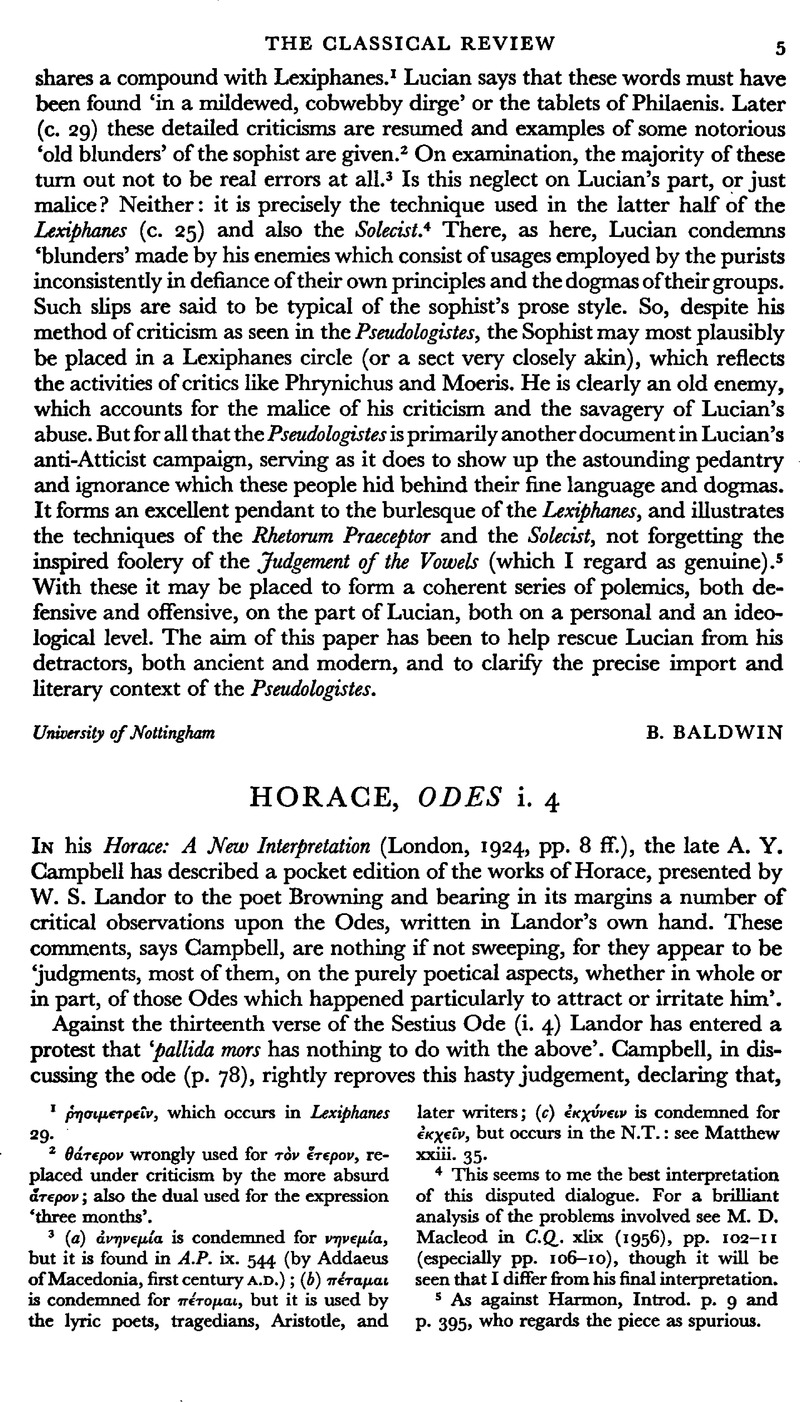No CrossRef data available.
Article contents
Horace, Odes i. 4
Published online by Cambridge University Press: 27 February 2009
Abstract

- Type
- Review Article
- Information
- Copyright
- Copyright © The Classical Association 1962
References
page 5 note 1 ῥησιμετρεῖν, which occurs in Lexiphanes 29.
page 5 note 2 θ⋯τερν wrongly used for τ⋯ν ἕτερον, replaced under criticism by the more absurd ἅτερον; also the dual used for the expression ‘three months’.
page 5 note 3 (a) ⋯νηνεμ⋯α is condemned for νηνεμ⋯α, but it is found in A.P. ix. 544 (by Addaeus of Macedonia, first century A.D.); (b) π⋯ταμαι is condemned for π⋯τομαι, but it is used by the lyric poets, tragedians, Aristotle, and later writers; (c) ⋯κχ⋯νειν is condemned for ⋯κχεῖν, but occurs in the N.T.: see Matthew xxiii. 35.
page 5 note 4 This seems to me the best interpretation of this disputed dialogue. For a brilliant analysis of the problems involved see Macleod, M. D. in C.Q. xlix (1956), pp. 102–111CrossRefGoogle Scholar (especially pp. 106–10), though it will be seen that I differ from his final interpretation.
page 5 note 5 As against Harmon, Introd. p. 9 and p. 395, who regards the piece as spurious.
page 6 note 1 Odes, Épodes et Chant Séculaire (Paris, 1924), p. 16.Google Scholar
page 7 note 1 Odes et Épodes (Paris, Les Belles Lettres, 1927), p. 12, n. 1.Google Scholar
page 7 note 2 Les Études classiques xiv (1946), pp. 174–194.Google Scholar
page 7 note 3 Varro, R.R. i. 28; Ovid, F. ii. 147 ff.; Columella xi. 2. 14; Pliny, N.H. ii. 122, xviii. 239.
page 7 note 4 Vegetius, iv. 39; cf. Cary, M., The Geographic Background of Greek and Roman History, p. 26.Google Scholar
page 7 note 5 Met. xi. 5; cf. Ausonius, Ecl. 23. 24.
page 7 note 6 R.E.L. xxv (1947), pp. 196–214.Google Scholar
page 9 note 1 Cf. Wissowa, , Religion und Kultus der Römer, p. 212, n. 10.Google Scholar
page 9 note 2 Dacier, André, Oeuvres d'Horace en latin et en françois, avec des remarques critiques et historiques (3ème édition, Paris, 1709), vol. 1, p. 85.Google Scholar
page 10 note 1 For the dating and duration of the dies parentales and the Feralia, see on Ovid, F. ii. 533. J. G. Frazer (London, 1929) and F. Bömer (Heidelberg, 1957–8); Fowler, W. Warde, The Roman Festivals, pp. 306 ff.Google Scholar; Wissowa, op. cit., pp. 232 ff.
page 10 note 2 Horace et la société romaine du temps d'Auguste (Collection de l'Institut Français de Varsovie, No. 5, Paris, 1938), p. 121.Google Scholar


